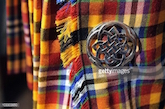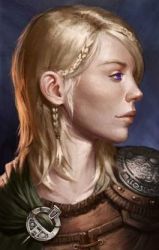0















| Thumbs Up |
| Received: 24 Given: 0 |

The following item shows what English would look like if it
were purged of its non-Germanic words, and used German-style
compounds instead of borrowings to express new concepts.
This recently appeared in the Conlang mailing list.
Here is Poul Anderson's essay "Uncleftish Beholding" ("Atomic
Theory"), reprinted from the revised edition appearing in his
collection _All One Universe_.
For most of its being, mankind did not know what things are made
of, but could only guess. With the growth of worldken, we began
to learn, and today we have a beholding of stuff and work that
watching bears out, both in the workstead and in daily life.
The underlying kinds of stuff are the *firststuffs*, which link
together in sundry ways to give rise to the rest. Formerly we
knew of ninety-two firststuffs, from waterstuff, the lightest and
barest, to ymirstuff, the heaviest. Now we have made more, such
as aegirstuff and helstuff.
The firststuffs have their being as motes called *unclefts*.
These are mightly small; one seedweight of waterstuff holds a
tale of them like unto two followed by twenty-two naughts. Most
unclefts link together to make what are called *bulkbits*. Thus,
the waterstuff bulkbit bestands of two waterstuff unclefts, the
sourstuff bulkbit of two sourstuff unclefts, and so on. (Some
kinds, such as sunstuff, keep alone; others, such as iron, cling
together in ices when in the fast standing; and there are yet
more yokeways.) When unlike clefts link in a bulkbit, they make
*bindings*. Thus, water is a binding of two waterstuff unclefts
with one sourstuff uncleft, while a bulkbit of one of the
forestuffs making up flesh may have a thousand thousand or more
unclefts of these two firststuffs together with coalstuff and
chokestuff.
At first is was thought that the uncleft was a hard thing that
could be split no further; hence the name. Now we know it is made
up of lesser motes. There is a heavy *kernel* with a forward
bernstonish lading, and around it one or more light motes with
backward ladings. The least uncleft is that of ordinary
waterstuff. Its kernel is a lone forwardladen mote called a
*firstbit*. Outside it is a backwardladen mote called a
*bernstonebit*. The firstbit has a heaviness about 1840-fold that
of the bernstonebit. Early worldken folk thought bernstonebits
swing around the kernel like the earth around the sun, but now we
understand they are more like waves or clouds.
In all other unclefts are found other motes as well, about as
heavy as the firstbit but with no lading, known as *neitherbits*.
We know a kind of waterstuff with one neitherbit in the kernel
along with the firstbit; another kind has two neitherbits. Both
kinds are seldom.
The next greatest firststuff is sunstuff, which has two firstbits
and two bernstonebits. The everyday sort also has two neitherbits
in the kernel. If there are more or less, the uncleft will soon
break asunder. More about this later.
The third firststuff is stonestuff, with three firstbits, three
bernstonebits, and its own share of neitherbits. And so it goes,
on through such everyday stuffs as coalstuff (six firstbits) or
iron (26) to ones more lately found. Ymirstuff (92) was the last
until men began to make some higher still.
It is the bernstonebits that link, and so their tale fastsets how
a firststuff behaves and what kinds of bulkbits it can help make.
The worldken of this behaving, in all its manifold ways, is
called *minglingken*. Minglingers have found that as the
uncleftish tale of the firststuffs (that is, the tale of
firststuffs in their kernels) waxes, after a while they begin to
show ownships not unlike those of others that went before them.
So, for a showdeal, stonestuff (3), glasswortstuff (11),
potashstuff (19), redstuff (37), and bluegraystuff (55) can each
link with only one uncleft of waterstuff, while coalstuff (6),
flintstuff (14), germanstuff (22), tin (50), and lead (82) can
each link with four. This is readily seen when all are set forth
in what is called the *roundaround board of the firststuffs*.
When an uncleft or a bulkbit wins one or more bernstonebits above
its own, it takes on a backward lading. When it loses one or
more, it takes on a forward lading. Such a mote is called a
*farer*, for that the drag between unlike ladings flits it. When
bernstonebits flit by themselves, it may be as a bolt of
lightning, a spark off some faststanding chunk, or the everyday
flow of bernstoneness through wires.
Coming back to the uncleft itself, the heavier it is, the more
neitherbits as well as firstbits in its kernel. Indeed, soon the
tale of neitherbits is the greater. Unclefts with the same tale
of firstbits but unlike tales of neitherbits are called
*samesteads*. Thus, everyday sourstuff has eight neitherbits with
its eight firstbits, but there are also kinds with five, six,
seven, nine, ten, and eleven neitherbits. A samestead is known by
the tale of both kernel motes, so that we have sourstuff-13,
sourstuff-14, and so on, with sourstuff-16 being by far the most
found. Having the same number of bernstonebits, the samesteads of
a firststuff behave almost alike minglingly. They do show some
unlikenesses, outstandingly among the heavier ones, and these can
be worked to sunder samesteads from each other.
Most samesteads of every firststuff are unabiding. Their kernels
break up, each at its own speed. This speed is written as the
*half-life*, which is how long it takes half of any deal of the
samestead thus to shift itself. The doing is known as
*lightrotting*. It may happen fast or slowly, and in any of
sundry ways, offhanging on the makeup of the kernel. A kernel may
spit out two firstbits with two neitherbits, that is, a sunstuff
kernel, thus leaping two steads back in the roundaround board and
four weights back in heaviness. It may give off a bernstonebit
from a neitherbit, which thereby becomes a firstbit and thrusts
the uncleft one stead up in the board while keeping the same
weight. It may give off a *forwardbit*, which is a mote with the
same weight as a bernstonebit but a forward lading, and thereby
spring one stead down in the board while keeping the same weight.
Often, too, a mote is given off with neither lading nor
heaviness, called the *weeneitherbit*. In much lightrotting, a
mote of light with most short wavelength comes out as well.
For although light oftenest behaves as a wave, it can be looked
on as a mote, the *lightbit*. We have already said by the way
that a mote of stuff can behave not only as a chunk, but as a
wave. Down among the unclefts, things do not happen in steady
flowings, but in leaps between bestandings that are forbidden.
The knowledge-hunt of this is called *lump beholding*.
Nor are stuff and work unakin. Rather, they are groundwise the
same, and one can be shifted into the other. The kinship between
them is that work is like unto weight manifolded by the fourside
of the haste of light.
By shooting motes into kernels, worldken folk have shifted
samesteads of one firststuff into samesteads of another. Thus did
they make ymirstuff into aegirstuff and helstuff, and they have
afterward gone beyond these. The heavier firststuffs are all
highly lightrottish and therefore are not found in the
greenworld.
Some of the higher samesteads are *splitly*. That is, when a
neitherbit strikes the kernel of one, as for a showdeal
ymirstuff-235, it bursts into lesser kernels and free
neitherbits; the latter can then split more ymirstuff-235. When
this happens, weight shifts into work. It is not much of the
whole, but nevertheless it is awesome.
With enough strength, lightweight unclefts can be made to
togethermelt. In the sun, through a row of strikings and
lightrottings, four unclefts of waterstuff in this wise become
one of sunstuff. Again some weight is lost as work, and again
this is greatly big when set beside the work gotten from a
minglingish doing such as fire.
Today we wield both kind of uncleftish doings in weapons, and
kernelish splitting gives us heat and bernstoneness. We hope to
do likewise with togethermelting, which would yield an unhemmed
wellspring of work for mankindish goodgain.
Soothly we live in mighty years!

I don't think I would understand that even with the non-germanic words placed back in.
It is strange to read and makes you wonder how much of our language we use that is non-germanic. I read somewhere that in writing we tend to use much more non-germanic language than we do in spoken form; perhaps the words feel more natural.













| Thumbs Up |
| Received: 24 Given: 0 |

Expressing abstract concepts in English always uses non-Germanic words. Typically ultimately-Latin-origin by way of Old French.
But in everyday speech, most sentences will be 100% Germanic.
"Hi there old friend! It's so good to see you again. Say, how 'bout the weather today! Never seen anything like it this time of year! The wind's blowing strong and the early morning fog's as thick as pea-soup. My God, I haven't seen it this cold in the month of April all my life. Maybe I've forgotten; hell, I am getting old, as you can well see! But then again, you can't forget it being this cold at this time of year, can you? Nah, I don't think so. It's most likely never been this cold in all history in the month of April. Nope, what we've got here now is nothing like April should be. Not here. ...Well now, it seems that it'll be rain later tonight, or maybe snow what with this cold snap! We'll see. Can you pour me some coffee? Thanks so much."
(I just made that up off the top of my head, trying to write simple everyday speech extemporaneously. Sure enough, every word therein is old Germanic origin. Except "coffee", but the drink known as coffee is a recent innovation in the world, after the languages developed).















| Thumbs Up |
| Received: 1,296 Given: 3,160 |

I was expecting it to be a bit more..... normal than that. I thought just replace words like 'the' and 'and' with their Anglo-Norman equivalents and voilà.
English without the Germanic words looks and sounds awful.














| Thumbs Up |
| Received: 272 Given: 87 |

Interestingly words like "waterstuff" and "sourstuff" really exist in the German language (Wasserstoff meaning hydrogen and Sauerstoff meaning oxygen)
The whole text is quite German-like.














| Thumbs Up |
| Received: 19,711 Given: 5,851 |

Seems ok for me apart from a couple of old words.
Suprised, thought it would've been difficult. Doesn't feel any harder to read than everyday speach.












| Thumbs Up |
| Received: 209 Given: 189 |

Old English as spoken by the Anglo-Saxons was closest to Old Frisian.















| Thumbs Up |
| Received: 1,296 Given: 3,160 |




















| Thumbs Up |
| Received: 2,614 Given: 4,516 |

Wrong posting. My bad.


















| Thumbs Up |
| Received: 7,856 Given: 7,299 |
There are currently 1 users browsing this thread. (0 members and 1 guests)
Bookmarks